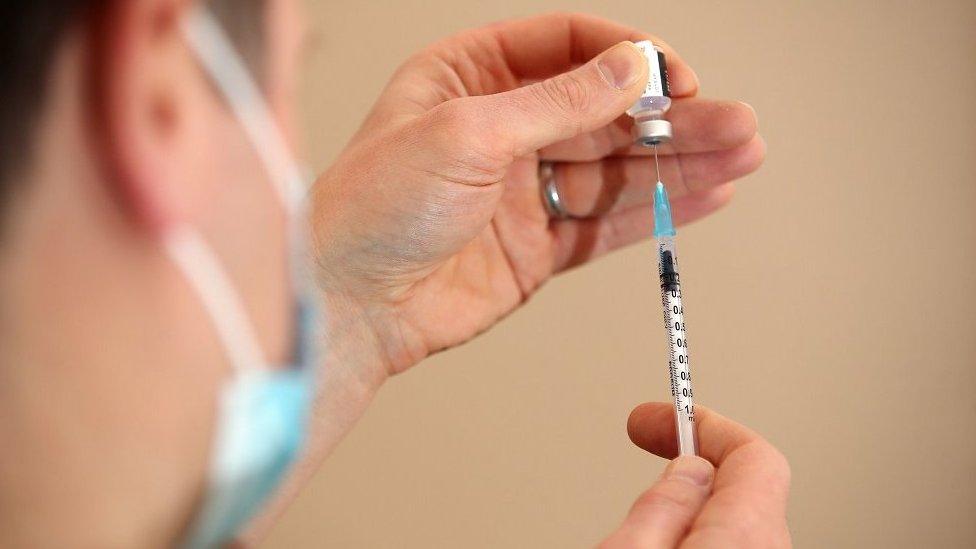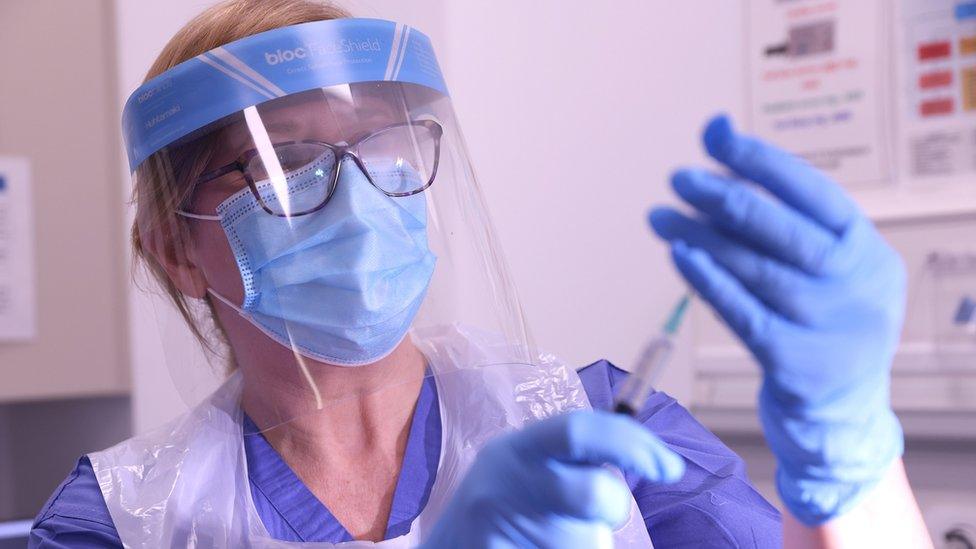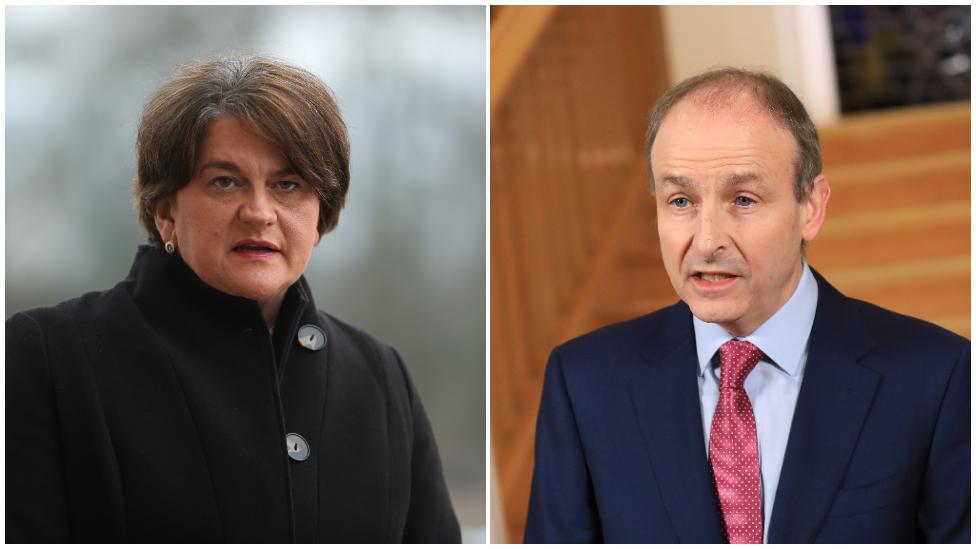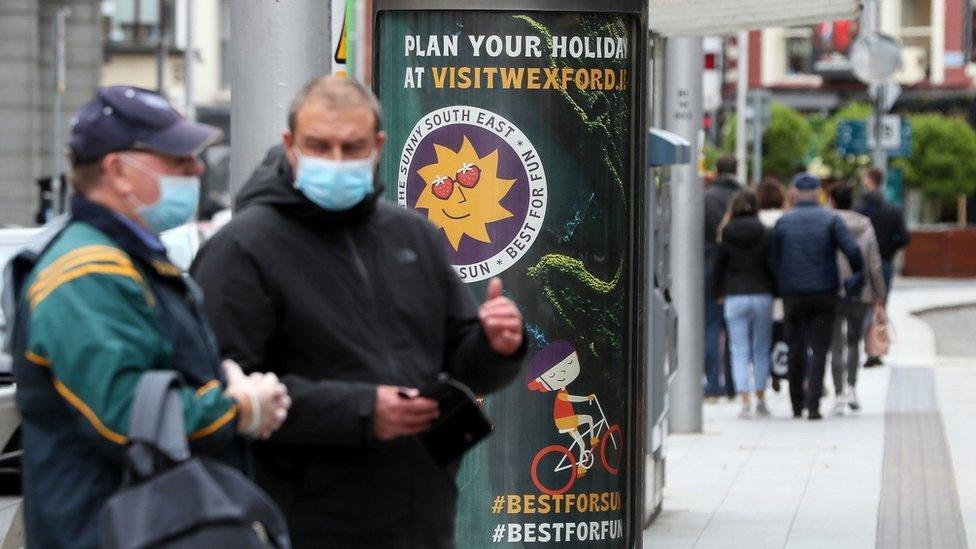Covid-19: Republic of Ireland to get 46,500 extra vaccines in March
- Published

The Republic of Ireland is to get an extra 46,500 doses of the Pfizer-BioNTech vaccine before the end of March.
Taoiseach (Irish Prime Minister) Micheál Martin said on Twitter that when the vaccines arrived, they would be administered quickly.
The European Commission said the doses would help tackle coronavirus hotspots and to facilitate free border movement.
On Saturday, the Republic of Ireland had 500,000 vaccines administered.
That figure includes both first and second doses.
Micheál Martin said on Twitter that he received confirmation of the extra doses on Wednesday morning.
Allow X content?
This article contains content provided by X. We ask for your permission before anything is loaded, as they may be using cookies and other technologies. You may want to read X’s cookie policy, external and privacy policy, external before accepting. To view this content choose ‘accept and continue’.
Mr Martin said he has been in contact with the Covid-19 vaccine manufacturer Pfizer about getting additional supplies.
But Mr Martin told the Dáil (lower house of parliament) that the drugs company, which has a plant in County Cork, is satisfied that it can meet its commitments to the EU from its plants in Belgium and Germany.
There were 47 additional covid-related deaths reported in the country on Tuesday, bringing the death toll to 4,499.
The Republic of Ireland also recorded 631 new cases of the virus, bringing that total to 224,588.
On Tuesday, Mr Martin admitted that the republic of Ireland's vaccination plan is behind schedule.
It had been hoped that 1.25 million vaccines would have been injected by the end of this month but he said the figure now is more likely to be 1.1 million.
Supply issues mainly relating to AztraZeneca are being blamed for the expected failure to reach the target.
It's understood that AstraZeneca has moved its delivery dates 23 times.
Speaking in the Dáil, Labour leader Alan Kelly called on the Republic of Ireland to follow the examples of Germany and Denmark and to attempt to get additional unused vaccine supplies.
Meanwhile, Aontú's Peader Toibín described the republic's vaccination roll-out as "a €1bn-a-month unmitigated disaster that is happening in this country".
In response to this, the taoiseach called on Mr Toibín to withdraw his remarks.
Mr Martin said the vaccination programme was working.
He added that those who are most vulnerable have been vaccinated, including most over 85s.
Extra vaccines arriving
The European Commission said the extra doses would be distributed on a pro rata basis.
President of the Commission Ursula von der Leyen said: "To tackle aggressive variants of the virus and to improve the situation in hotspots, quick and decisive action is necessary.
"I'm happy to announce today an agreement with BioNTech-Pfizer, who will offer to member states to make available a total of four million doses of vaccines before the end of March which will be supplied in addition to the planned dose deliveries.
"This will help member states in their efforts to keep the spread of new variants under control.
"Through their targeted use where they are most needed, in particular in border regions, these doses will also help ensure or restore free movement of goods and people. These are key for the functioning of health systems and the single market."
Meanwhile, Tánaiste (Irish Deputy PM) Leo Varadkar tweeted that he hoped the single-dose Janssen vaccine would be approved on Thursday.
Allow X content?
This article contains content provided by X. We ask for your permission before anything is loaded, as they may be using cookies and other technologies. You may want to read X’s cookie policy, external and privacy policy, external before accepting. To view this content choose ‘accept and continue’.
Mr Varadkar spoke to RTÉ's News at One about the delays to vaccines arriving in Ireland.
He said: "I know it's very frustrating and it undermines confidence - we're sorry about it, but it's out of our control - deliveries change regularly.
"The vaccine programme is going as fast as it can, as soon as it arrives in the country, within a week it's in people's arms, usually within three days."
The European Commission said that the increase of dose deliveries in March is because of a successful expansion of manufacturing capacities in Europe which was completed by mid-February.
- Published9 March 2021

- Published7 March 2021

- Published23 February 2021
